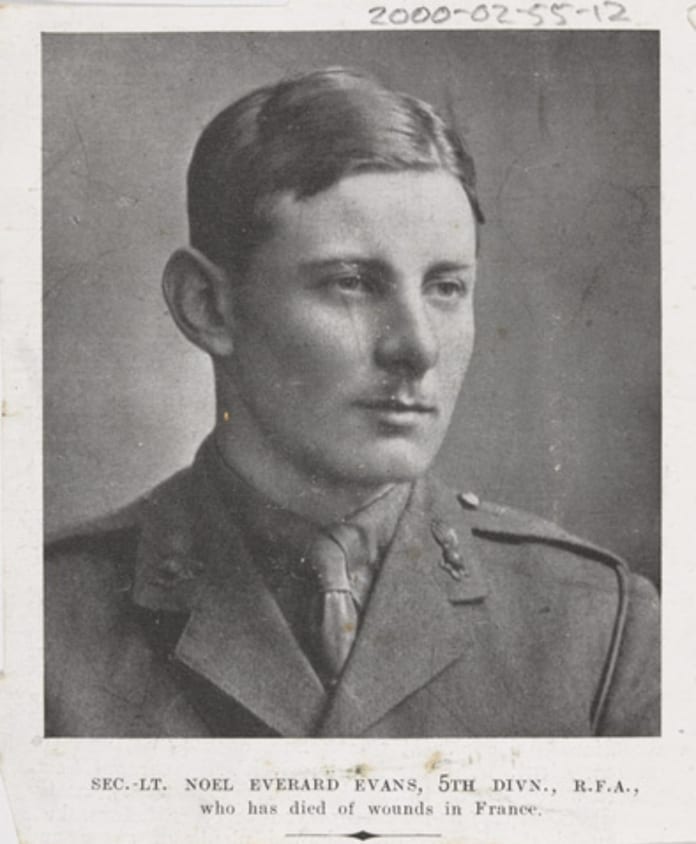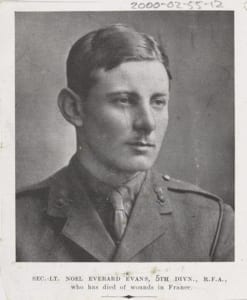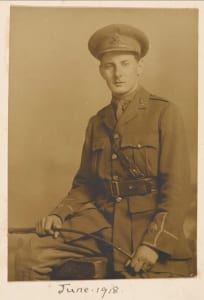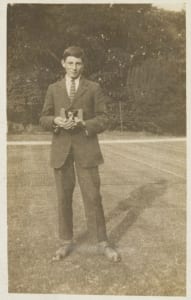Family letters tell tragedy of young soldier’s death on Armistice Day
Letters between the family of 19-year-old Welsh soldier Noel Evans, tell the bittersweet story of Armistice. His parents arrive in France to find that he’d died of shell blast wounds the morning peace was signed.
100 years later, his story is shared through personal artefacts on the National Army Museum’s commemorative website.
London, 7 November 2018 – A collection of letters and photographs from the archive at the National Army Museum depict the conflicting emotions of Armistice. They describe the tragic death of 19-year-old Second Lieutenant Noel Evans on the morning peace he was signed, and the impact it had on those close to him.
For thousands of families who had suffered the loss of loved ones during the war, the signing of the Armistice on the 11th of November 1918, was a bittersweet occasion. Feelings of jubilation and relief that the fighting had ended were tempered by heartache and anguish at the terrible price that had been paid for peace.
Noel Evans had arrived at the front in mid-September of 1918. He was serving with the 121st Battery in the 27th Brigade, Royal Field Artillery, the unit in which his brother also served. By the time Noel arrived, this formation had been in almost continuous action since the German Spring Offensive of March 1918, and was now taking part in the Allied advance that took place after their victory at the Battle of Amiens in August. During his brief time in service, Noel and his comrades were frequently exposed to grave dangers and he survived several near misses. On the 24th of October 1918 he wrote home:
“We are at the moment halting, waiting for more orders. We often see the civilians of the towns, they look very ill, most of them. I have been having quite a thrilling time lately being chased by shells, but so far have been very lucky. I have got a piece of shrapnel that missed my cheek by a fraction of an inch and hit a wall beside me, so pocketed it and moved on.”
Noel’s luck finally ran out during the Battle of the Sambre. On the 4th of November 1918, a week before the hostilities ended, a shell burst a few yards from the dug-out where he was on duty. His commanding officer, Major L Bonner, 121st Battery, later wrote to his parents describing the events:
“At about 6.30am, Noel went on duty and remained at the guns till 7.30am. Soon after this, at about 7.45am I should think, I was standing outside the dug-out and Noel walked towards me and we stood chatting for a few minutes; then I re-turned to the dug-out and had just stooped under the tarpaulin when a shell burst a few yards away.
“Our cook, who stood at the entrance of the dug-out, fell over on top of me, shot through the neck, and I was busy bandaging him when Noel was brought in. He appeared to be slightly wounded in the left thigh and right heel, and a tiny splinter was pulled out of the back of his head; his thigh seemed to worry him most, but the hit on the head had caused him to go temporarily blind: we put this down to concussion.”
Noel was evacuated to a hospital in the rear, while the Allied advance continued. Under relentless pressure, the Germans were eventually forced to sue for peace. At 5am on the 11th of November 1918, in a railroad carriage at Compiègne in France, the Allies signed an armistice with Germany. At 11am that day, the ceasefire came into effect, finally ending the war.
Noel’s parents travelled to France to visit him in hospital. However, on arrival they were informed that their son had succumbed to his wounds in the early hours of Armistice Day. Although the recipient of this letter from his father is unknown, it helps capture the tragedy with clarity and beauty:
“It has been the hardest week to bear of my life… the uncertainty of the dear laddies’ condition. The suspense at the last moment when we reached the hospital and the crushing words of the matron “I’m afraid I have bad news for you”. We were too late. He had passed away on Monday morning in the early hours, strange to say just about the time the armistice was signed!
“We reached the cemetery just in time. There were 2 other officers and about 20 privates buried at the same time. Noel was carried by five soldiers and five officers marched at the side… 3 volleys were fired and the “Last Post” sounded at the end. And there we have left our dear high-spirited laddie, who loved everybody and I believe was loved by all… It is such hard lines that he should have been taken at the very end of the war.”
Peace came at a huge price. 1918 was the most devastating year on the Western Front. The mobile warfare since March had cost each side over a million men. Noel was buried in a cemetery near Rouen along with 30 of his comrades. Against the backdrop of the victory celebrations, his heart-broken family headed back to Britain to mourn, with his mother Violet Evans writing to her sister on the 16th of November:
“To think that we shall never see his dear smile again. It’s all been so cruelly hard… all the horrible noise and crowds and rejoicing everywhere day and night, it has been a continuous nightmare and the journey back I thought never would come to an end. It was such an awful shock when we got there to be told he had already gone to the cemetery… I don’t know how to face life without him.”

| [donate]
| Help keep news FREE for our readersSupporting your local community newspaper/online news outlet is crucial now more than ever. If you believe in independent journalism,then consider making a valuable contribution by making a one-time or monthly donation. We operate in rural areas where providing unbiased news can be challenging. |






















